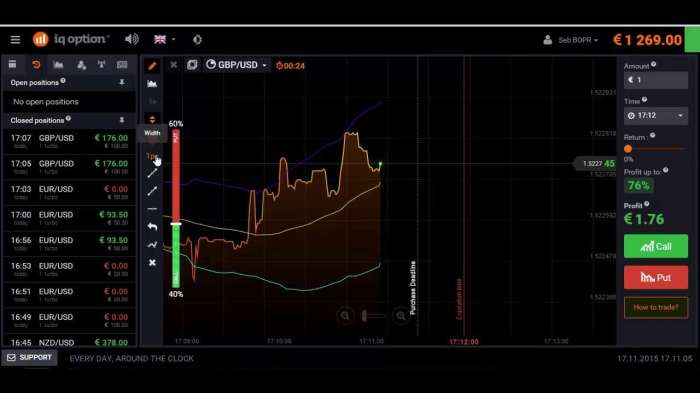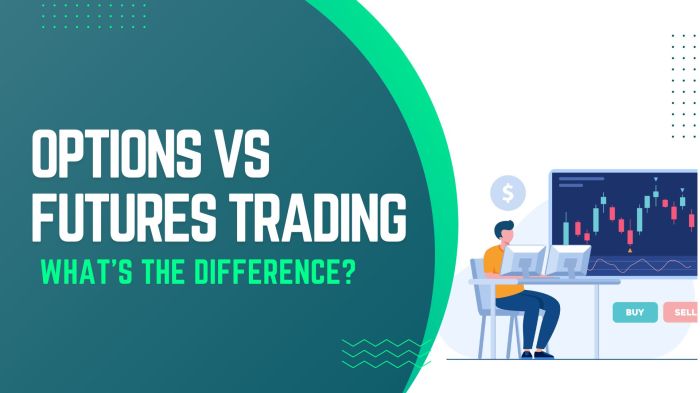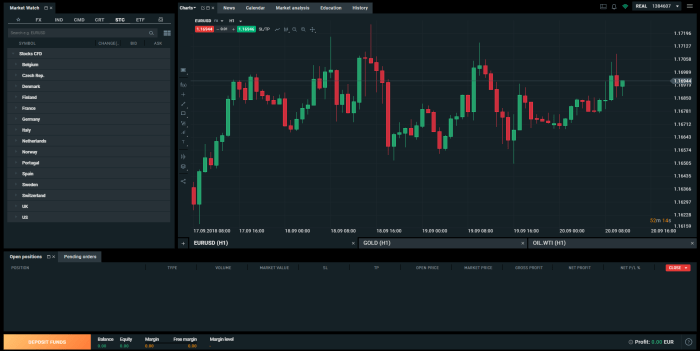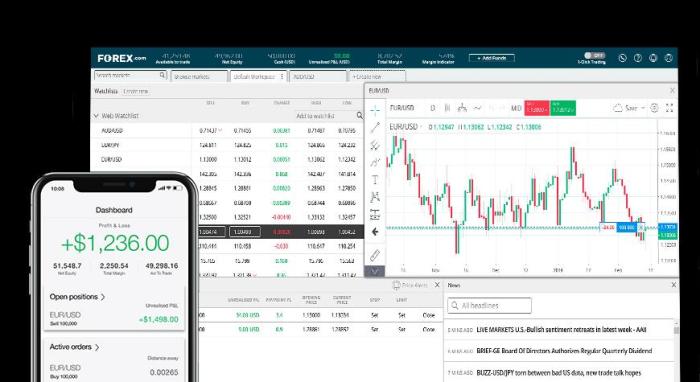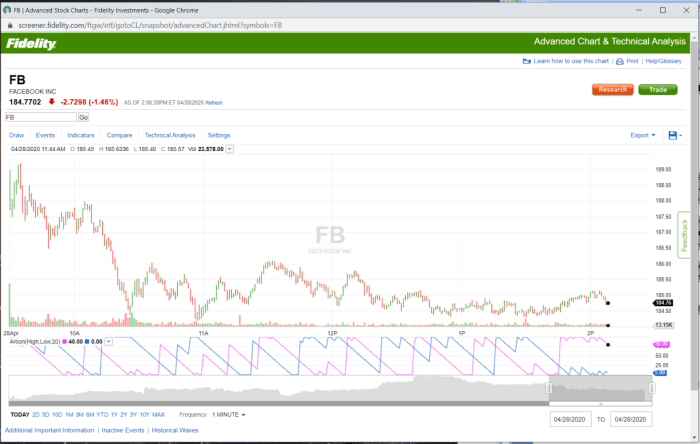
Fidelity forex trading isn’t just about making money; it’s about building trust. This journey explores the multifaceted meaning of “fidelity” in the forex world – from broker trustworthiness to your own commitment to a trading plan. We’ll dissect what constitutes a high-fidelity trading experience, uncovering the secrets to navigating this complex market with integrity and achieving consistent results. Think of it as your cheat sheet to a more reliable and potentially lucrative forex adventure.
We’ll delve into crucial aspects like choosing brokers who prioritize transparency and ethical practices, mastering risk management techniques that keep you grounded, and understanding the role of regulation in ensuring fair play. From algorithmic strategies to the importance of a strong client-broker relationship, we’ll equip you with the knowledge to build a sustainable and trustworthy forex trading journey.
Defining Fidelity in Forex Trading
In the fast-paced and often volatile world of forex trading, the concept of “fidelity” takes on multifaceted meanings beyond simple accuracy. It encompasses the trustworthiness of a broker, the precision of their platform, and the overall loyalty demonstrated in their relationship with the client. Understanding these different facets is crucial for navigating the complexities of the forex market and making informed decisions.
Fidelity in forex trading can be interpreted in several key ways. First, there’s the aspect of *accuracy*. This refers to the broker’s commitment to providing accurate pricing, execution speeds, and data. A lack of accuracy can lead to significant losses for traders due to slippage, inaccurate quotes, or delayed order execution. Second, *trustworthiness* is paramount. This involves the broker’s financial stability, regulatory compliance, and transparent business practices. Traders need to trust that their funds are safe and that the broker operates ethically. Finally, *loyalty* represents the broker’s commitment to its clients’ success. This can manifest in providing excellent customer service, educational resources, and tools to aid trading decisions.
Broker Demonstrations of Fidelity
A broker demonstrating high fidelity might offer features like ultra-low latency execution, ensuring orders are filled at the requested price with minimal slippage. They might also provide detailed account statements, transparent fee structures, and readily available customer support. Robust security measures, such as two-factor authentication and segregated client accounts, also contribute to a perception of trustworthiness. Furthermore, a commitment to providing educational materials, webinars, and market analysis demonstrates loyalty to client success, equipping them with the knowledge to make informed trading decisions.
Broker Failures in Fidelity
Conversely, a broker failing to demonstrate fidelity might exhibit characteristics such as frequent price manipulation, significant slippage, or unexplained delays in order execution. Lack of transparency in fees, hidden charges, or difficulty accessing customer support are also red flags. A broker’s failure to adequately safeguard client funds, leading to security breaches or misuse of funds, is a clear breach of trustworthiness. The absence of educational resources and support for traders further indicates a lack of commitment to their success.
Fidelity in Forex Compared to Other Markets
While fidelity is essential across all financial markets, its manifestation varies. In forex, the decentralized and 24/7 nature of the market amplifies the importance of accurate and timely execution. Compared to regulated stock markets, forex has a higher potential for fraudulent activity, making trustworthiness a critical factor. The level of sophistication required to successfully trade forex also means that brokers’ commitment to providing educational resources and tools is arguably more crucial than in other markets where self-directed learning might be sufficient. For example, the level of regulatory oversight varies significantly between forex brokers and those operating in regulated stock or futures markets, impacting the level of trust and protection afforded to investors.
Broker Selection and Fidelity

Choosing the right forex broker is crucial, especially when focusing on fidelity – the broker’s trustworthiness and commitment to fair practices. A broker’s fidelity directly impacts your trading experience, from the accuracy of quotes to the security of your funds. Selecting a broker lacking fidelity can lead to significant financial losses and frustration.
Key Factors for Selecting a High-Fidelity Forex Broker
Several key factors should guide your broker selection process. These factors directly relate to the broker’s commitment to transparent and ethical practices, ensuring a fair and reliable trading environment. Consider these points carefully before entrusting your capital to any broker.
| Factor | Description | Importance | Example |
|---|---|---|---|
| Regulation and Licensing | Ensure the broker is regulated by a reputable financial authority. This provides a level of oversight and protection for traders. | High | A broker regulated by the FCA (UK), ASIC (Australia), or CFTC (USA) generally indicates a higher level of regulatory scrutiny. |
| Transparency of Fees and Spreads | Clearly defined and competitive fees and spreads are essential. Avoid hidden charges or manipulative pricing practices. | High | Compare brokers’ fee schedules and spread structures before choosing one. Look for brokers that clearly display all costs upfront. |
| Execution Speed and Slippage | Fast and accurate order execution is vital. High slippage or frequent order rejections can indicate a lack of fidelity. | High | Check reviews and testimonials to assess a broker’s order execution speed and the frequency of slippage experienced by traders. |
| Security of Funds | Choose brokers with robust security measures to protect client funds from theft or loss. Look for segregated accounts and insurance coverage. | High | Brokers utilizing segregated accounts keep client funds separate from their operational funds, reducing the risk of loss in case of broker insolvency. |
Red Flags Indicating a Lack of Broker Fidelity
Identifying red flags is crucial to avoid brokers with questionable practices. These warning signs often point towards a lack of commitment to fair trading and client protection. Ignoring them could lead to significant financial losses.
Some common red flags include:
- Unrealistic promises of high returns: Be wary of brokers promising exceptionally high returns with minimal risk. Such promises are often deceptive.
- Aggressive sales tactics and high-pressure selling: Legitimate brokers focus on educating clients, not pressuring them into making hasty decisions.
- Lack of regulation or regulation from an obscure jurisdiction: Unregulated brokers operate with little to no oversight, posing significant risks to traders.
- Difficulty contacting customer support or unresponsive support: Poor communication and difficulty reaching support staff are significant warning signs.
- Negative reviews and complaints from multiple sources: A pattern of negative feedback online should raise serious concerns.
- Missing or unclear terms and conditions: Opaque or incomplete legal documentation is a major red flag.
Comparison of High-Fidelity and Low-Fidelity Forex Brokers
The table below highlights the key differences between high-fidelity and low-fidelity forex brokers, providing a clear contrast to aid in your selection process.
| Feature | High-Fidelity Broker | Low-Fidelity Broker |
|---|---|---|
| Regulation | Regulated by reputable authorities (e.g., FCA, ASIC, CFTC) | Unregulated or regulated by an obscure authority |
| Transparency | Clearly defined fees, spreads, and terms and conditions | Hidden fees, unclear pricing, and opaque terms |
| Order Execution | Fast, accurate execution with minimal slippage | Slow execution, frequent slippage, and order rejections |
| Security | Segregated accounts, robust security measures, and insurance coverage | Lack of security measures, commingled funds, and no insurance |
Trading Strategies and Fidelity
Maintaining fidelity in forex trading means sticking to your chosen strategy, regardless of market fluctuations or emotional impulses. This consistency is crucial for long-term success, as it allows you to rigorously test and refine your approach, ultimately leading to better risk management and potentially higher returns. Deviating from a well-defined strategy often results in inconsistent performance and increased losses.
Consistent application of a chosen trading strategy is paramount to success in the forex market. Understanding different strategies and their implications for maintaining fidelity is key to developing a robust and profitable trading plan. This section will explore various strategies and compare the levels of fidelity achievable with different trading approaches.
Algorithmic Trading versus Discretionary Trading: A Fidelity Comparison
Algorithmic trading, or automated trading, relies on pre-programmed rules and algorithms to execute trades. This inherently fosters high fidelity because the system executes trades precisely as designed, eliminating emotional biases and impulsive decisions. Discretionary trading, on the other hand, involves human judgment and interpretation of market conditions. While this allows for flexibility and adaptation, it also introduces the potential for inconsistency and deviations from a planned strategy, leading to lower fidelity. Algorithmic systems, once properly backtested and optimized, offer greater consistency and adherence to the defined trading plan. Human traders, however, are susceptible to psychological factors like fear and greed that can disrupt their strategy.
Case Study: The Benefits of Strategy Fidelity, Fidelity forex trading
Let’s consider a hypothetical trader, Alex, who employs a mean reversion strategy. This strategy involves identifying assets that have deviated significantly from their average price and betting they will revert back. Alex meticulously defines his entry and exit points based on standard deviation bands and uses a strict risk management system, never risking more than 2% of his capital on any single trade. Over a year, Alex diligently follows his strategy, documenting every trade and adjusting parameters only after thorough analysis. In contrast, another trader, Ben, also using a mean reversion strategy, frequently deviates from his plan, taking additional trades based on gut feeling or reacting to market news. While both traders might experience periods of profit and loss, Alex’s consistent adherence to his strategy leads to more stable returns and a lower maximum drawdown (the largest peak-to-trough decline during a specific period). Alex’s fidelity to his strategy, coupled with proper risk management, results in a significantly better outcome compared to Ben’s inconsistent approach. This highlights the crucial role of discipline and fidelity in achieving long-term success in forex trading.
Regulatory Compliance and Fidelity: Fidelity Forex Trading
Maintaining fidelity in forex trading isn’t just about brokers acting ethically; it hinges on robust regulatory oversight. Regulatory bodies play a crucial role in establishing and enforcing rules designed to protect traders and ensure market integrity. Without this framework, the forex market would be vulnerable to manipulation, fraud, and a general lack of trust.
Regulatory compliance acts as the bedrock of trust and accuracy in forex trading. When brokers operate within a well-defined regulatory framework, traders can feel more confident that their funds are safe, transactions are executed fairly, and disputes are handled impartially. This confidence fosters a more stable and efficient market, encouraging participation and investment.
Regulatory Bodies and Their Functions
Regulatory bodies worldwide set standards for forex brokers, conducting regular audits and investigations to ensure compliance. These bodies often mandate minimum capital requirements, restrict leverage levels to mitigate risk, and demand transparent reporting practices. Examples include the Financial Conduct Authority (FCA) in the UK, the Commodity Futures Trading Commission (CFTC) in the US, and the Australian Securities and Investments Commission (ASIC) in Australia. Each body has specific rules and enforcement mechanisms, but the overarching goal remains the same: to protect investors and maintain market integrity.
Examples of Regulatory Breaches Compromising Fidelity
Breaches in regulatory compliance can severely damage market fidelity. For example, a broker failing to segregate client funds, commingling them with the firm’s operational funds, exposes traders to significant losses if the broker faces financial difficulties. Similarly, manipulating price quotes, engaging in market spoofing (placing orders with no intention to execute them to influence prices), or providing misleading information to clients are all serious breaches that erode trust and can lead to substantial financial losses for traders. In 2021, for instance, a major forex broker was fined millions of dollars by the FCA for failing to adequately monitor client accounts and prevent suspicious trading activity, demonstrating the significant consequences of non-compliance. Such instances highlight the importance of choosing regulated brokers and understanding the regulatory landscape before engaging in forex trading.
Technological Aspects and Fidelity
The forex market’s breakneck speed and immense volume rely heavily on technology. The fidelity of your trading experience – from data accuracy to order execution – is directly tied to the technological infrastructure supporting your chosen broker and trading platform. A robust technological foundation is paramount for maintaining trust and ensuring fair market participation.
Technological advancements significantly impact data fidelity and execution speed in forex trading. High-frequency trading (HFT) algorithms, for example, depend on microsecond-level data accuracy and lightning-fast order execution. Any latency or inaccuracy in the data feed can lead to significant losses, highlighting the critical role of technology in maintaining the integrity of transactions. Similarly, advancements in data analytics allow traders to access and process vast amounts of information, enabling more informed decisions and potentially improving trading outcomes. However, these advancements also increase the potential for manipulation or misuse if not properly regulated and monitored.
Reliable Trading Platforms and Fidelity Maintenance
A reliable trading platform is the cornerstone of maintaining fidelity in forex trading. These platforms must offer real-time data feeds with minimal latency, ensuring traders receive up-to-date market information to make timely decisions. Secure order execution systems are also crucial, preventing slippage and ensuring that orders are filled at the intended price. Furthermore, robust security measures, including encryption and fraud detection systems, are essential to protect trader accounts and data from cyber threats. A platform lacking these features can lead to significant losses due to delayed executions, inaccurate data, or security breaches. For example, a platform experiencing a prolonged outage during a volatile market event could prevent a trader from closing a losing position, resulting in substantial financial losses.
Technological Failures and Compromise of Forex Transactions
Technological failures can severely compromise the fidelity of forex transactions. These failures can range from minor glitches, such as temporary platform outages, to major disruptions, like widespread system failures affecting multiple brokers. A sudden loss of connectivity can prevent traders from accessing the market, missing out on potential opportunities or being unable to manage existing positions. Data errors, whether due to software bugs or faulty data feeds, can lead to inaccurate pricing and flawed trading decisions. Furthermore, security breaches can result in the theft of funds or sensitive personal information, severely impacting trader confidence and the overall integrity of the market. The 2010 Flash Crash, while not solely attributable to technological failures, highlighted the vulnerability of the market to cascading events triggered by technological issues and algorithmic trading strategies. The resulting market volatility caused significant losses for many traders, emphasizing the critical importance of robust technological infrastructure and regulatory oversight.
Education and Fidelity in Forex Trading
Maintaining fidelity in forex trading isn’t just about sticking to a strategy; it’s about cultivating a deep understanding of the market and your own trading psychology. Consistent education is the bedrock of this fidelity, empowering traders to make informed decisions and resist impulsive actions driven by fear or greed. A well-rounded education equips traders with the knowledge and discipline to navigate the complexities of the forex market successfully and responsibly.
The forex market is notoriously volatile, and without proper education, traders are easily swayed by short-term fluctuations, abandoning sound strategies in favor of chasing quick profits. This lack of discipline often leads to significant losses. Conversely, a strong educational foundation helps traders weather market storms, maintaining their commitment to their chosen strategies and risk management plans. This consistency, this fidelity to a well-defined approach, is crucial for long-term success.
Resources and Methods for Enhancing Forex Trading Understanding
Numerous resources are available to help traders improve their understanding of forex trading and enhance their fidelity to sound practices. These resources range from free online courses and webinars to paid educational programs offered by reputable brokers and financial institutions. Independent learning through books, articles, and market analysis websites is also crucial. Furthermore, engaging with experienced traders through online forums and communities provides invaluable insights and practical advice. Active participation in these communities fosters a sense of accountability and shared learning, strengthening adherence to disciplined trading habits. Consistent review and self-assessment are equally important to identify weaknesses and refine one’s approach.
A Curriculum for Maintaining Fidelity in Forex Trading
This curriculum focuses on building a strong foundation in forex trading principles and cultivating disciplined trading habits. It emphasizes risk management, technical and fundamental analysis, and the importance of emotional control.
* Module 1: Introduction to Forex Trading: This module covers the basics of forex trading, including terminology, market mechanics, and different types of orders. It also introduces fundamental concepts like leverage and margin.
* Module 2: Technical Analysis: This module delves into chart patterns, technical indicators, and candlestick analysis. Traders will learn how to identify potential trading opportunities using technical tools and interpret market trends.
* Module 3: Fundamental Analysis: This module explores macroeconomic factors that influence currency exchange rates, such as interest rates, inflation, and geopolitical events. Traders will learn to assess the fundamental strength of different currencies.
* Module 4: Risk Management: This module is crucial and covers topics like position sizing, stop-loss orders, and money management strategies. It emphasizes the importance of protecting capital and avoiding excessive risk.
* Module 5: Trading Psychology: This module addresses the emotional challenges of forex trading, including fear, greed, and overconfidence. Traders will learn techniques to manage their emotions and maintain discipline.
* Module 6: Backtesting and Journaling: This module teaches traders how to backtest their strategies and maintain a trading journal to track their performance and identify areas for improvement. This promotes self-awareness and continuous refinement of trading approaches.
* Module 7: Regulatory Compliance: This module covers regulatory requirements and best practices to ensure ethical and legal trading.
Key Concepts Essential for Achieving Fidelity in Forex Trading
A strong understanding of these key concepts is essential for maintaining fidelity to sound trading practices and achieving long-term success.
Prior to outlining these concepts, it is vital to understand that consistent application and self-reflection are crucial. Simply knowing these concepts is insufficient; diligent practice and honest self-assessment are key to successful implementation.
- Thorough Market Research: Understanding market dynamics, economic indicators, and geopolitical events is crucial for informed decision-making.
- Defined Trading Plan: A well-defined trading plan, including entry and exit strategies, risk management rules, and position sizing, is essential for consistency.
- Strict Risk Management: Never risk more than you can afford to lose. Employing stop-loss orders and adhering to a pre-defined risk-reward ratio is paramount.
- Emotional Discipline: Avoiding impulsive trades driven by fear or greed is vital. Maintaining a calm and rational approach is crucial for long-term success.
- Continuous Learning: The forex market is constantly evolving. Continuous learning and adaptation are essential for staying ahead of the curve.
- Record Keeping and Analysis: Maintaining detailed records of trades, analyzing performance, and identifying areas for improvement are crucial for consistent growth.
- Diversification: Spreading investments across different currency pairs helps mitigate risk and improve overall portfolio performance.
Client-Broker Relationship and Fidelity
In the dynamic world of forex trading, the relationship between a client and their broker is paramount. It’s not just about executing trades; it’s about building a foundation of trust and mutual respect that underpins the entire trading experience. A strong client-broker relationship, built on transparency and open communication, directly impacts the fidelity – the honesty and integrity – of the trading process. Without this essential bond, even the most sophisticated trading strategies can falter.
The cornerstone of a successful client-broker relationship is unwavering transparency and open communication. This means brokers need to be upfront about fees, risks, and any potential conflicts of interest. Clients, in turn, need to feel comfortable asking questions and voicing concerns without fear of reprisal. This open dialogue fosters a sense of partnership, where both parties work collaboratively towards shared goals.
Transparency and Open Communication Foster Trust
Transparency involves providing clients with clear, concise, and readily accessible information. This includes detailed explanations of trading platforms, account statements, and any changes in brokerage policies. Open communication ensures that clients can easily reach their broker via various channels – phone, email, live chat – and receive prompt, helpful responses. Brokers who proactively share market insights and educational resources further demonstrate their commitment to client success and build stronger relationships. For example, a broker might offer regular webinars or personalized consultations to address individual client needs and concerns. This proactive approach goes beyond simply fulfilling transactional obligations and builds a sense of loyalty and trust.
Building Trust and Loyalty Through Broker Actions
Several specific actions can significantly enhance client trust and loyalty. For instance, a broker could offer competitive pricing and transparent fee structures, eliminating any hidden costs that could erode client confidence. Providing access to advanced trading tools and educational resources empowers clients to make informed decisions and increases their satisfaction. Furthermore, prompt and efficient customer service, readily available through multiple channels, significantly contributes to a positive trading experience. A broker demonstrating responsiveness to client inquiries and concerns reinforces the feeling of being valued and supported. Consider a broker who promptly addresses a client’s technical issue with their trading platform, resolving the problem quickly and efficiently. This immediate action builds trust and shows the broker’s commitment to client satisfaction.
Impact of a Strong Client-Broker Relationship on Trading Fidelity
A strong client-broker relationship directly translates into a more trustworthy and reliable trading experience. When clients feel understood, respected, and supported, they are more likely to have confidence in their broker’s services and the overall trading process. This confidence reduces trading anxiety and allows clients to focus on making informed decisions based on market conditions rather than worrying about hidden fees or manipulative practices. Conversely, a lack of transparency and poor communication can lead to distrust, potentially causing clients to make rash decisions or even switch brokers, ultimately hindering their trading success. A positive, collaborative relationship ensures the integrity of the trading process, fostering a sense of security and promoting long-term success for both the client and the broker.
End of Discussion
Ultimately, fidelity in forex trading boils down to a commitment – a commitment to your strategy, your risk management plan, and your chosen broker. It’s about building a foundation of trust and transparency, fostering a relationship where integrity and accuracy are paramount. By understanding the nuances of fidelity, you’re not just trading forex; you’re building a solid path towards financial success. This isn’t just about profits; it’s about creating a trading experience built on solid ethical ground.
Understand how the union of trading signals forex can improve efficiency and productivity.
Discover how que es el trading forex has transformed methods in this topic.

